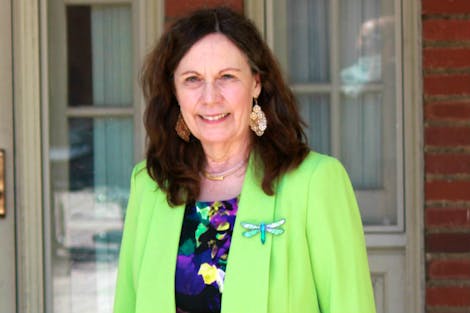Researcher Found Home for Pioneering Work at UR School of Nursing
By Nora Williamson
Thursday, January 19, 2017
Mary Wilde ’99N (PhD) finally found her professional home at the University of Rochester School of Nursing.
After earning her nursing diploma from the Lenox Hill Hospital School of Nursing in 1968, she traversed the East Coast and Midwest over the next three and a half decades, working in community health nursing while following her husband John in his work with the Presbyterian Church. In the mid-1980's, she pursued a master’s degree in community health nursing at the University of Michigan. Her advisor there was Carol Brink ’56N, ’62N, MPH, RN, who was collaborating with Thelma Wells on opening the first continence clinic in the country.
Her association with Brink and Wells and their groundbreaking work on urinary incontinence would have a lasting effect on Wilde, drawing her to the University of Rochester and ultimately launching her as an international expert in research focused on improving the self-management of people using long-term catheters.

A 1992 Loretta Ford Fellow, Wilde chose to pursue her doctorate at the University of Rochester in part because of the presence of Brink and Wells, but also because of the school’s strong emphasis on clinical research. She completed her PhD in 1999, then left for teaching positions at Syracuse University and University of Massachusetts-Amherst before turning to Rochester once again. Wilde had a self-management pilot study all ready to go at UMass in 2004, but the faculty research grant she needed to complete the work was not available. Recalling her experiences as a doctoral student, Wilde left to join the faculty at the UR School of Nursing and promptly received a grant that jump-started more than a decade of prolific research.
Within three years, Wilde had four research studies funded, including a $1.7 million, five-year NIH grant that studied self-management of urine flow in people using long-term indwelling urinary catheters.
“This school helped me to do that,” said Wilde. “I’ve been the luckiest person in the world.”
Though she retired as a faculty member at the close of the 2016 academic year, Wilde has barely slowed down. She is continuing to disseminate the results of her studies, the last of which was a $421,000 R21 project that ended in April 2016, and remains a consultant with a team of researchers in the United Kingdom. She is also collaborating with a group of UR Nursing faculty members on a paper looking at the concept of self-monitoring in different clinical contexts.
And, Wilde is serving as a mentor to other researchers pursing lines of study similar to her own. Her research is so distinct that there are few, if any, scholars in the world who have tackled the subject as comprehensively as Wilde has over the past 30 years. For her work to be sustained, it’s critical that she link to a new generation of researchers. To that end, she’s serving on the PhD committee of a nursing student at the University of Nebraska-Lincoln. She has also created online learning modules which she shared at the International Continence Society meeting in Tokyo this past September to promote dissemination and use of her research materials.
“I can’t think of anyone in the U.S. working on anything close to mine,” said Wilde, who was named professor emerita by the UR Board of Trustees in October. “Really, nobody’s working on self-management, nobody’s looking at catheter issues at the level and complexity that I have. I know that I can support researchers. I feel like I’ve done the work.
“It was hard to retire, because in some ways this was the perfect job for me,” she said. “This is the best job I’ve ever had. Not just the travel – which was a big bonus – but the research, the community, the support of people who value me as a person as well as a researcher. It’s just time to shift into another direction.”
This story was originally featured in the Fall 2016 NURSING magazine.
Categories: Research

